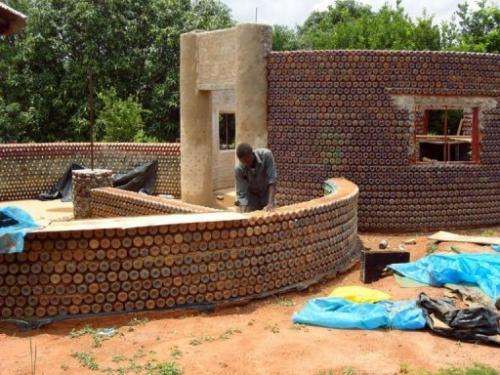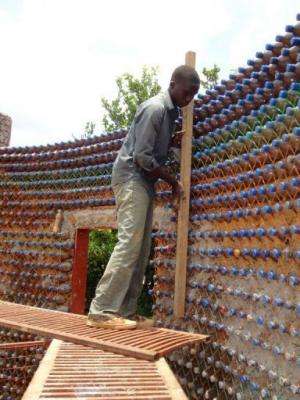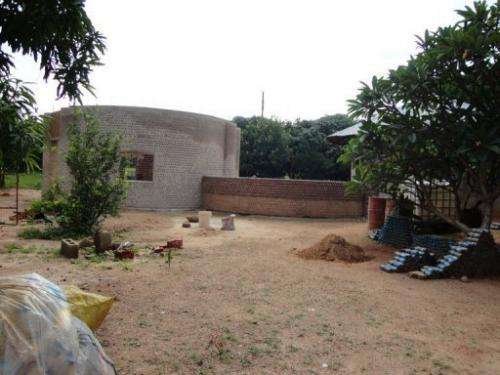Plastic bottles solve Nigeria's housing problem

The idea undoubtedly seemed strange at first: take the plastic water bottles that litter Nigeria's roads, canals and gutters and allow people to live inside them.
Not literally, but almost.
What a group of activists did was come up with a plan to build a house using those bottles, providing what they say is an environmentally smart strategy of chipping away at a housing shortage in Africa's most populous nation.
With the prototype near the northern Nigerian city of Kaduna now well underway, the group wants to extend its efforts and build more, aiming to unleash what they say is some long bottled-up potential.
Unconvinced? Supporters say those yet to see the structure on the outskirts of the village of Sabon Yelwa can throw stones if they want to. This house is being built to last.
"This is the first house in Africa built from bottles, which could go a long way in solving Nigeria's huge housing need and cleaning the badly polluted environment," project initiator Christopher Vassiliu said during a tour of the building.

It is in many ways a marvel to look at. The project was initiated by the Kaduna-based NGO Development Association for Renewable Energies (DARE), with help from foreign experts from Africa Community Trust, a London-based NGO.
Sitting on 58-square metres (624-square feet), the two-bedroom bungalow looks like an ordinary home, but it differs in many ways. When completed, the house whose construction started in June will be used to train masons in building such structures.
It is made from capped, sand-filled plastic bottles, each weighing three kilogrammes, or nearly two pounds.
The bottles are stacked into layers and bonded together by mud and cement, with an intricate network of strings holding each bottle by its neck, providing extra support to the structure.
Bottle caps of various colours protrude from the cement-plastered walls, giving them a unique look. Those behind the project claim the sand-filled bottles are stronger than ordinary cinder blocks.
"The structure has the added advantage of being fire proof, bullet proof and earthquake resistant, with the interior maintaining a constant temperature of 18 degrees C (64 degrees F) which is good for tropical climate," Yahaya Ahmad, the project coordinator said.

With the right adjustments to the supporting pillars the building can be as high as three stories, but can go no higher due to the weight of the sand-filled bottles, Ahmad said.
Situated amidst an expansive irrigation farm, the building consists of a rotunda-shaped living room which connects to the interior via a short corridor.
Two rooms stand opposite with a bathroom and a toilet between them. A side door leads to an open courtyard and the kitchen.
The house is also designed to produce zero carbon emissions as it will be wholly powered by solar panels and methane gas from recycled human and animal waste.
"Nigeria has a serious waste and energy problem, and this project is one small step towards making positive changes," said Katrin Macmillan, a British environmental activist involved in the project.
"Plastic bottles take hundreds of years to bio-degrade in landfills."
Construction, which has reached 70 percent completion, is estimated to require 14,000 bottles. Huge piles of empty plastic bottles litter the site from donations from embassies, hotels and restaurants.
Environmental experts say Nigeria, a country of some 160 million, throws out about three million plastic bottles daily.
The country is also grappling with a deficit of 16 million housing units that requires a staggering 45 trillion naira ($300 billion) to meet, according to Nigeria's Federal Mortgage Bank.
Plastic houses are cheap to construct as it costs a quarter of the money required to build a conventional house, said Vassiliu, a Greek national who has been working in Nigeria as a water drilling engineer for 30 years.
The project is to cost two million naira ($12,700), Vassiliu said.
A second plastic bottle project is due to commence in January at a primary school in need of more classrooms in the town of Suleja near Nigeria's capital Abuja.
"The project would take 200,000 bottles out of landfills into education", said Macmillan.
(c) 2011 AFP



















